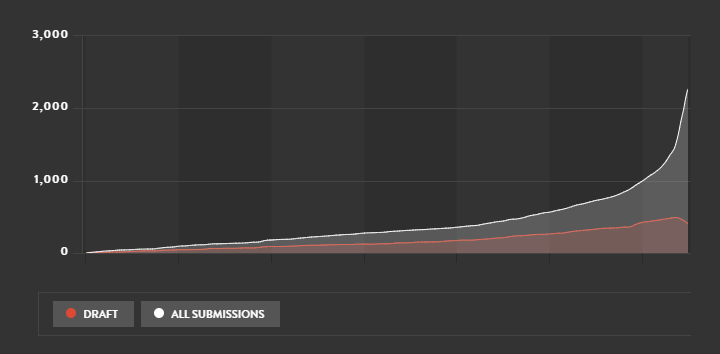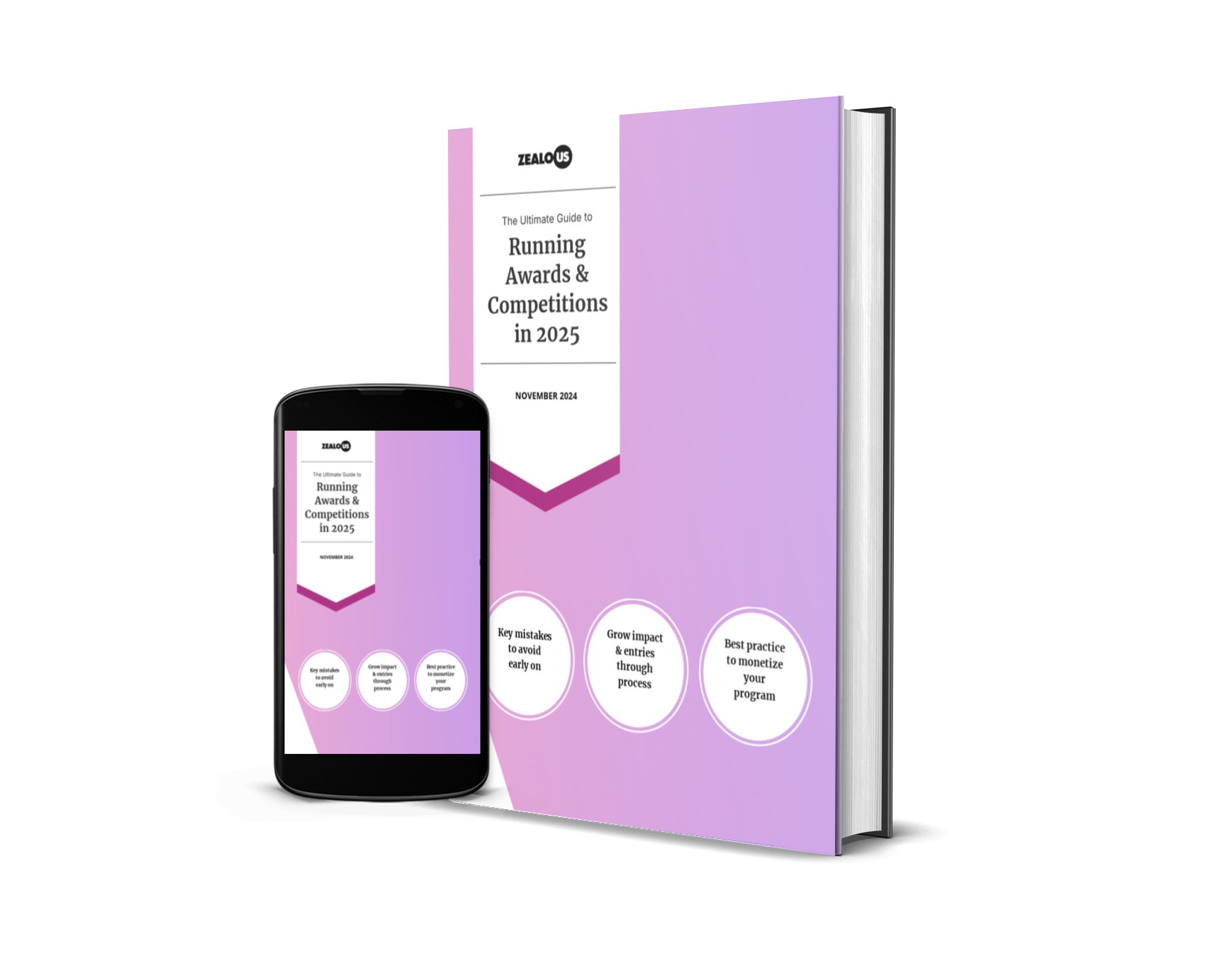This article covers:
- Planning your schedule effectively
- Giving candidates and judges the right amount of time
- Understanding when to launch your programme
- Preparing for the unexpected
The Basics
The process of creating a schedule is simple.
- Map out key moments in your programme
- Associate dates to them
Which key moments you choose to include in your programme is heavily dependent on your process and I would recommend you read this article first before proceeding any further.
Example key moments could include:
- Publish programme
- Submissions (Open / Close)
- Selection Round (Judging Starts, Judging Ends, Selection)
- Other Key dates (e.g. Exhibition Opening, Award Ceremony etc.)
Plan today, save time later.
Making sure you plan your schedule early is vital for running an efficient open call.
Changing dates halfway through running your programme can lead to a domino effect. This holds especially true of moving dates earlier in your process as they will push all subsequent dates. So if you’ve invited lots of judges to score entries on future dates, you’ll need to re-organise everyone again, which could lead to judges dropping out due to conflicting diaries.
Spending a little time planning your schedule and making space between steps will ensure your programme runs smoothly for everyone.
Start with days, not dates
It’s tempting to use dates when you first start planning your schedule (e.g. opens on the 28th of February, closes on the 31st of March). However, using dates can lead to miscalculating the amount of time you have between steps (e.g. judging between the 28th of February and the 2nd of March would only give your judges less than two days).
To know exactly how much time you have to undertake those specific actions calculate your schedule using days instead (e.g. submissions open for 21 days, then we judge the shortlist for seven days and announce winners nine days later).
Once you are happy with the amount of time between steps, establish your starting date and calculate the dates for each step. Or to save time by downloading our amazing scheduling template which will calculate all the dates for you automatically!
The big picture
No one likes having to swap a festive period with a lengthy application form.
Check your timeline against relevant holidays (bank, school, religious etc. ) to ensure no one misses out on a festive meal. If you are working with candidates and judges globally, be sure to account for local holidays.
NOTE. Bank holidays with no specific celebration could be good before your submissions close since they might give candidates a chance to submit during that time.
Also, be mindful of other days of rest. Closing on Shabbat will impact submissions coming from the communities that do not work on those days.
Rules of thumb
How long you give candidates and judges to perform their tasks depends on what you want from them. Asking artists to submit existing works will take less time than artists creating work based on a brief.
Every open call is unique, but on average, we have seen the following timelines work well.
- Publish your call at least a week before submissions open so you can begin getting people excited about submitting. If you expect candidates to create something for you, publishing it earlier will give them more time to prepare.
- Submissions should open for a minimum of 4 weeks; and a maximum of 3 months. If you host a big call with early bird entry fees, 6 to 8 months is perfectly acceptable.
- Extensions should never be longer than 15% of the total length of your call (opening for 20 days would lead to a three-day extension). Extensions should be a maximum of two weeks and not be extended again. Long extensions will make you look like you are struggling to get submissions and is unlikely to help.
- How long you give judges is heavily dependent on your process and how many submissions you are expecting.
Note that having short timelines for specific actions will make those periods more intense for those taking part in them. For example, the smaller your submissions period is, the more effort you will put into your marketing during that period.
Last-minute rushes
Humans are notorious for waiting until the last minute. No matter how long you open submissions for, it’s likely that more than 60% of all entries will come in on the final 2-3 days.

Opening submissions for eight months is unlikely to get any engagement at the start since the deadline is too far in the future for the candidates to care. However, you can inspire candidates to submit earlier with incentives such as early bird fees, feedback on early entries etc.
Be sure to add these dates to your schedule and market them the way you would your submissions closing.
Making space
There will always be a disappointed candidate who just missed the deadline.
We’ve seen two equally valid responses to this eventuality. A statement of fact – “you had two months to submit” and one of empathy “we have extended our submissions by two days”.
Putting an extension in your planning will give you the option, later on, to have one without impacting future dates (or ignoring it and proceeding with the next step).
With proper marketing, extensions also give you the chance to grow submissions with two last-minute surges.
Fostering diversity & inclusion
If you know people will struggle with the tech (e.g. older generations), consider an extension to allow you to support them during that time.
Evenings & weekends are sacred
When we pick dates we tend to gravitate to the ends of days (midnight) and weeks (Sunday). It’s tempting to close submissions at midnight on a Sunday night (or Saturday if you’re working the Islamic workweek).
Don’t.
Having submissions close when no one is there to support candidates is likely to lead to frustration. Ensure your closing dates happen during work hours, ideally in the afternoons (closing submissions on Monday at 16:00 is a much better choice).
… but always include at least one weekend
You may be inadvertently locking out candidates/judges who have punishing workweeks if your submissions or judging starts on a Monday and ends on the Friday of the same week.
Having at least one Weekend, if not two, allows external stakeholders to use their “free time” to get involved with your programme.
Fostering diversity & inclusion
Days off are different for everyone (working in a supermarket, working an Islamic workweek etc.). But if you have a minimum of 7 days to undertake an action, you’ll likely be supportive of a majority of your communities.
If you take a fee
If you require a fee, make sure your submissions (and any early bird deals you have) close when candidates have the means to pay you.
Look out for other expenses your candidates will have throughout the year. Make sure your submission does not compete with being able to buy Christmas/Diwali/Eid presents.
Consider closing submissions and special deals just after payday. Employees in the UK get paid on the last Friday of every month (freelancers are harder to model due to sporadic cash flows). This makes the first Monday after payday an ideal date for closing any special deals you might have.
You might also want to research any other calls like yours taking a fee and making sure you don’t both take payments at the same time. This could put candidates in a position where they can either submit to your open call or a competing one.
Expect the unexpected
Once you’ve planned your dates, ask yourself whether your system will work if the unexpected happens. Will a day and a half for your long list be enough if 10,000 people apply? What do you do if your only judge becomes unavailable (sick?)…
Create space in your schedule by adding an extra week between each selection round. That means if one of your judges cannot complete scoring entries on time, you will have seven additional days to allow them to finish their task without impacting future rounds.
Fostering diversity & inclusion
Stress links directly to people’s mental well-being. Catching potentially stressful situations early will allow you to safeguard those on your project.
Making changes midway
No matter how hard you try, sometimes you may need to change the dates of your programme whilst you are running it.
Making changes to your timelines is fine so long as you are transparent about it and keep all your stakeholders up-to-date with any changes as soon as you can.
For example, moving the results of a round two weeks later will lead to candidates bombarding your inbox for results. Emailing everyone before they start asking will save you time managing your inbox and build credibility with your candidates.
Conclusion
Your schedule is the backbone of the relationships you build with your candidates and judges. Crafting it as best as possible before your programme launches will save you countless hours later.
Time is sacred, and the additional work you put in planning your timeline will translate directly to giving your stakeholders a great experience they will remember.
Want us to write more content like this? Give it a like
Share

Guy Armitage is the founder of Zealous and author of “Everyone is Creative“. He is on a mission to amplify the world’s creative potential.











